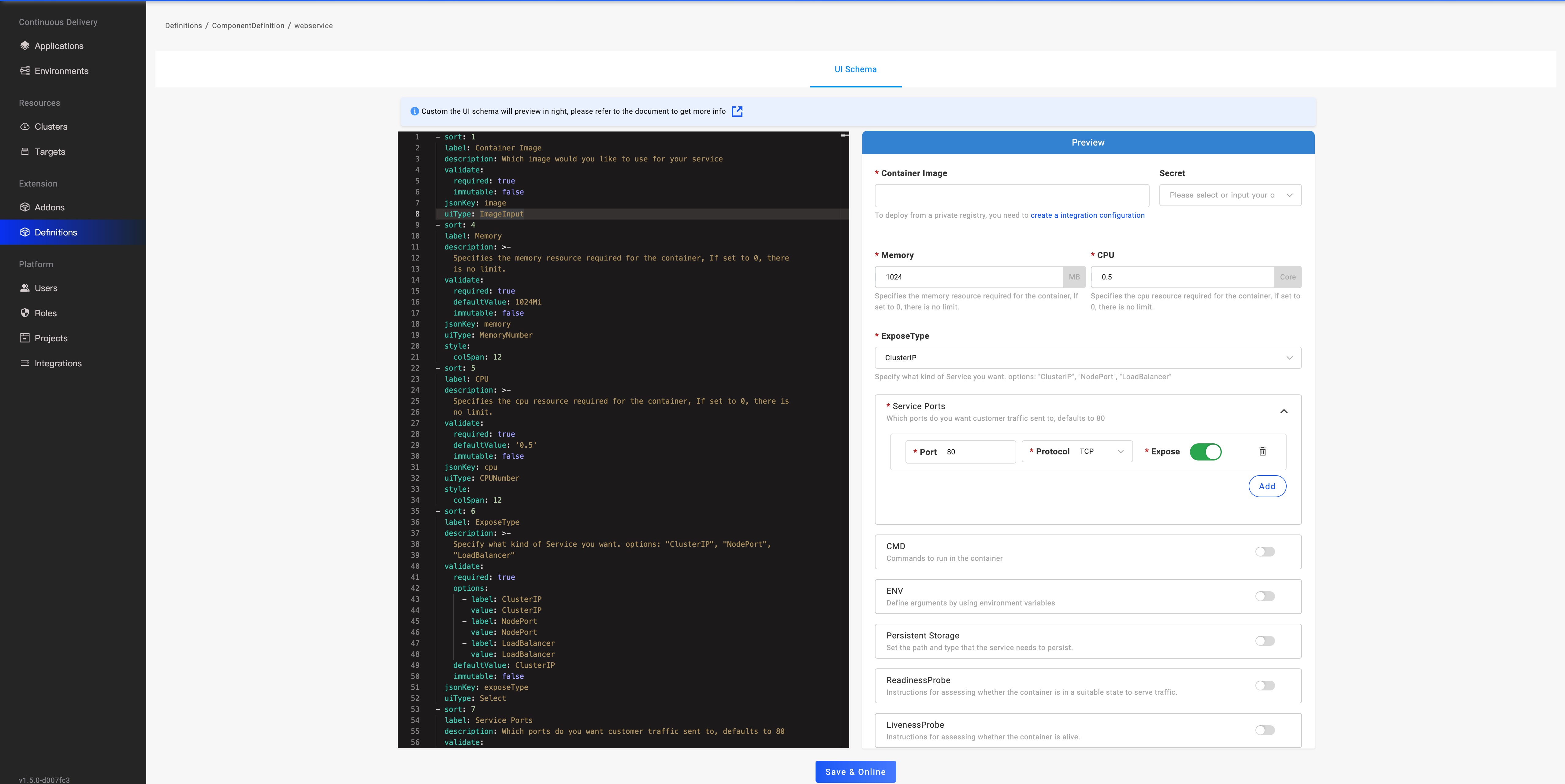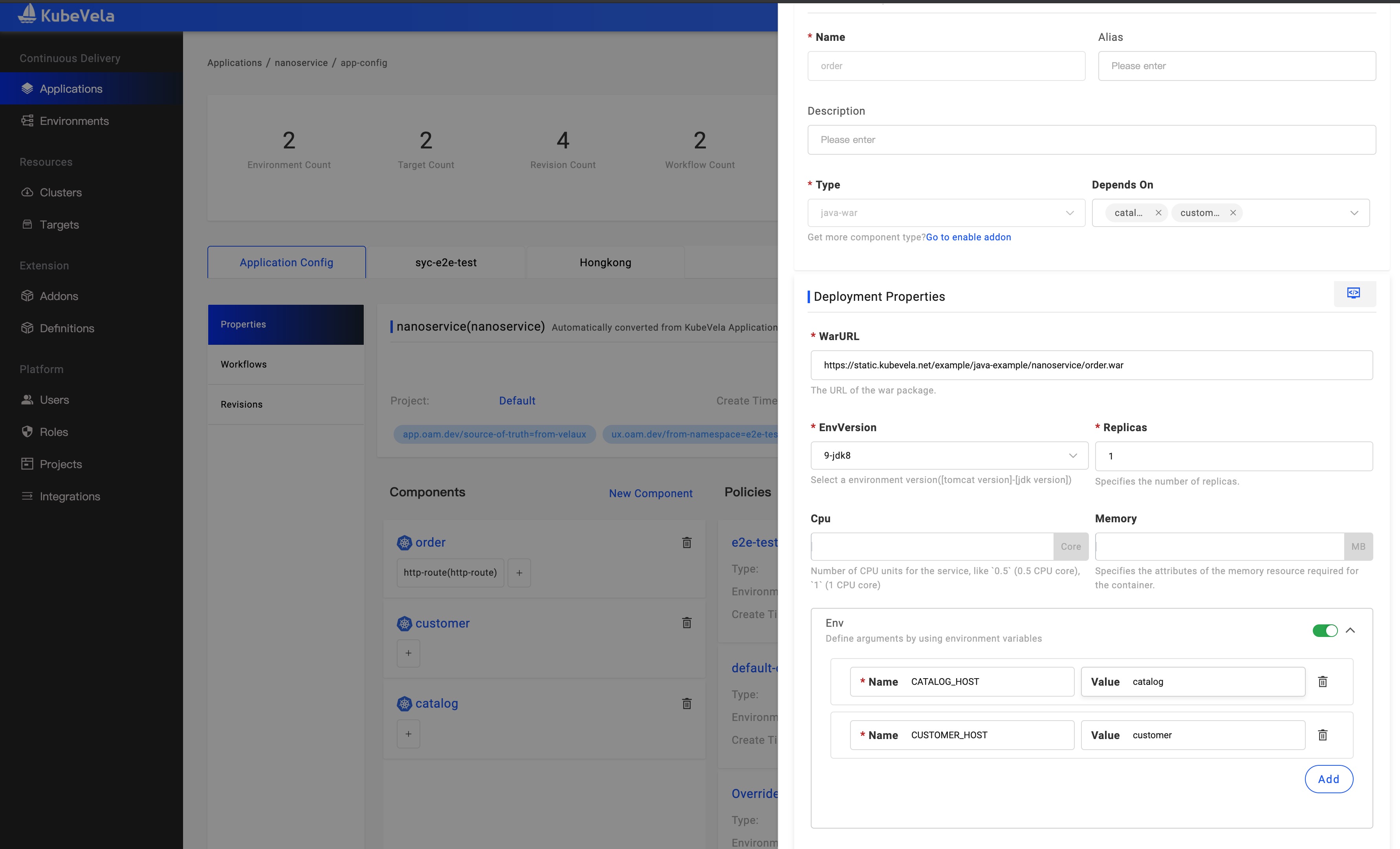自定义容器交付
如果默认的 webservice 组件类型不能满足你的团队,并且你希望获得一种更简单的方式来部署业务应用。 本指南将为你提供帮助。 在此之前,你必须获得平台管理员的权限。
简化 webservice 类型
默认的 webservice 组件类型有超过 10 个属性。 也许你的开发者只需要配置镜像路径和资源限制。 对于其他属性,团队可以设置默认值。如果是这样,你可以更改 webservice 定义。
- 更改 UI schema 以隐藏某些字段
这种方式只适合 UI 用户。

在定义详情页面,用户可以自定义 UI schema 来设置 UI 表单。 例如,如果要隐藏 ExposeType 字段,只需要设置 disable 为 true。
...
- jsonKey: exposeType
uiType: Select
label: ExposeType
disable: true
...
更多参考: UI Schema
- 更改定义并增删字段
如果要完全删除或添加某些字段,则应编辑组件定义。
本指南需要先学习 CUE 语言。
vela def get webservice > custom-webservice.cue
参考CUE基础和组件定义文档,了解如何自定义 custom-webservice.cue。
编辑完成之后:
vela def apply custom-webservice.cue
创建一个新的组件类型来部署 war 包
如果你的团队使用 war 包来部署 Java 应用。 在 KubeVela 中,你可以创建一个新的组件类型来部署 War 包。
"java-war": {
alias: ""
annotations: {}
attributes: {
workload: {
definition: {
apiVersion: "apps/v1"
kind: "Deployment"
}
type: "deployments.apps"
}
status: {
customStatus: #"""
ready: {
readyReplicas: *0 | int
} & {
if context.output.status.readyReplicas != _|_ {
readyReplicas: context.output.status.readyReplicas
}
}
message: "Ready:\(ready.readyReplicas)/\(context.output.spec.replicas)"
"""#
healthPolicy: #"""
ready: {
updatedReplicas: *0 | int
readyReplicas: *0 | int
replicas: *0 | int
observedGeneration: *0 | int
} & {
if context.output.status.updatedReplicas != _|_ {
updatedReplicas: context.output.status.updatedReplicas
}
if context.output.status.readyReplicas != _|_ {
readyReplicas: context.output.status.readyReplicas
}
if context.output.status.replicas != _|_ {
replicas: context.output.status.replicas
}
if context.output.status.observedGeneration != _|_ {
observedGeneration: context.output.status.observedGeneration
}
}
isHealth: (context.output.spec.replicas == ready.readyReplicas) && (context.output.spec.replicas == ready.updatedReplicas) && (context.output.spec.replicas == ready.replicas) && (ready.observedGeneration == context.output.metadata.generation || ready.observedGeneration > context.output.metadata.generation)
"""#
}
}
description: ""
labels: {}
type: "component"
}
template: {
output: {
apiVersion: "apps/v1"
kind: "Deployment"
metadata: {
name: context.name
namespace: context.namespace
}
spec: {
replicas: parameter.replicas
selector: {
matchLabels: {
"app.oam.dev/component": context.name
}
}
template: {
metadata: {
labels: {
"app.oam.dev/name": context.appName
"app.oam.dev/component": context.name
"app.oam.dev/revision": context.revision
}
}
spec: {
initContainers: [{
name: "prepare-war"
image: "busybox"
if parameter["deployToRoot"] != _|_ {
if parameter["deployToRoot"] {
command: ["wget", "-O", "/usr/local/tomcat/webapps/ROOT.war", parameter["warURL"]]
}
}
if parameter["deployToRoot"] == _|_ {
command: ["wget", "-P", "/usr/local/tomcat/webapps/", parameter["warURL"]]
}
volumeMounts: [{
name: "webapps"
mountPath: "/usr/local/tomcat/webapps"
}]
}]
containers: [{
name: context.name
image: "tomcat:" + parameter["envVersion"]
if parameter["cpu"] != _|_ {
resources: {
limits: cpu: parameter.cpu
requests: cpu: parameter.cpu
}
}
if parameter["memory"] != _|_ {
resources: {
limits: memory: parameter.memory
requests: memory: parameter.memory
}
}
ports: [{
containerPort: 8080
name: "webapp"
}]
_envs: {
custom: *parameter["env"] | []
inner: [
if parameter["javaOpts"] != _|_ {
{
name: "JAVA_OPTS"
value: parameter.javaOpts
}
},
]
}
env: _envs.custom + _envs.inner
volumeMounts: [{
name: "webapps"
mountPath: "/usr/local/tomcat/webapps"
}]
}]
volumes: [{
name: "webapps"
emptyDir: {}
}]
}
}
}
}
outputs: {
services: {
kind: "Service"
apiVersion: "v1"
metadata: {
name: context.name
namespace: context.namespace
}
spec: {
selector: "app.oam.dev/component": context.name
ports: [{
port: 8080
}]
type: "ClusterIP"
}
}
}
parameter: {
// +usage=The URL of the war package.
warURL: string
// +usage=Select a environment version([tomcat version]-[jdk version])
envVersion: *"8-jdk8" | "9-jdk8" | "10-jdk8" | "8-jdk11" | "9-jdk11" | "10-jdk11" | "8-jdk17" | "9-jdk17" | "10-jdk17"
// +usage=Specifies the number of replicas.
replicas: *1 | int
// +usage=Define arguments by using environment variables
env?: [...{
name: string
value?: string
}]
// +usage=Setting the Java Opts configuration.
javaOpts?: string
// +usage=Number of CPU units for the service, like `0.5` (0.5 CPU core), `1` (1 CPU core)
cpu?: string
// +usage=Specifies the attributes of the memory resource required for the container.
memory?: =~"^([1-9][0-9]{0,63})(E|P|T|G|M|K|Ei|Pi|Ti|Gi|Mi|Ki)$"
deployToRoot?: bool
}
}
复制上面的定义来创建一个文件 java-war.cue,然后:
vela def apply java-war.cue
现在,其他开发人员可以使用 war URL 创建应用,例如:
apiVersion: core.oam.dev/v1beta1
kind: Application
metadata:
name: nanoservice
namespace: e2e-test
spec:
components:
- name: catalog
properties:
envVersion: 8-jdk8
replicas: 1
warURL: https://static.kubevela.net/example/java-example/nanoservice/catalog.war
type: java-war
- name: customer
properties:
envVersion: 8-jdk8
replicas: 1
warURL: https://static.kubevela.net/example/java-example/nanoservice/customer.war
type: java-war
- dependsOn:
- catalog
- customer
name: order
properties:
env:
- name: CATALOG_HOST
value: catalog
- name: CUSTOMER_HOST
value: customer
envVersion: 8-jdk8
javaOpts: -Xms512m -Xmx512m -Xss256K
replicas: 1
warURL: https://static.kubevela.net/example/java-example/nanoservice/order.war
traits:
- properties:
domains:
- nanoservice.beijing.kubevela.net
rules:
- path:
type: PathPrefix
value: /order
port: 8080
type: http-route
type: java-war
policies:
- name: e2e-test
properties:
clusters:
- local
namespace: e2e-test
type: topology
workflow:
steps:
- name: deploy2-e2e-test
properties:
policies:
- e2e-test
type: deploy

这个例子包括三个组件,order 服务依赖 catalog 和 customer 服务。 开发者只需要关心 war 包 URL 和 tomcat/JRE 版本,Java开发者对此都很熟悉。 开发人员应将 war 包上传到仓库,例如 Jfrog。 获取下载 URL 以分配给 warURL 字段。
同样,你可以创建一个组件类型来部署 Jar 包和其他二进制包。